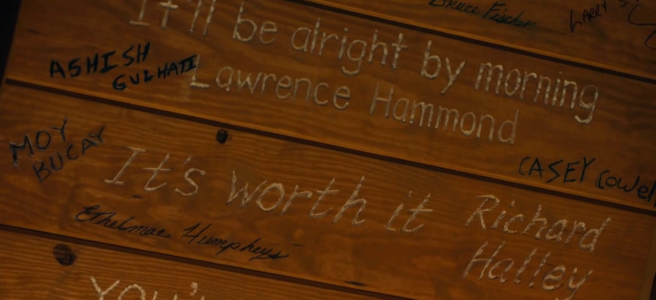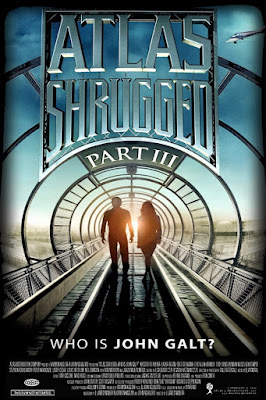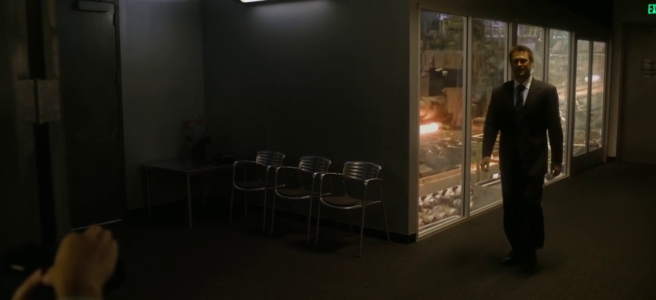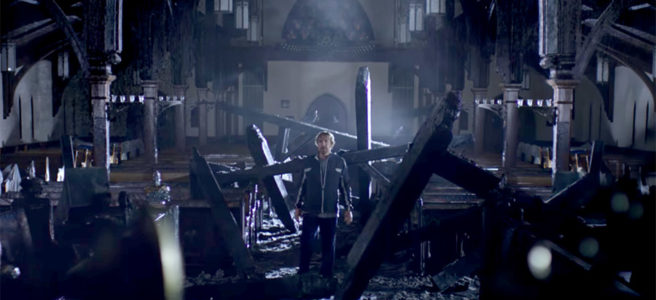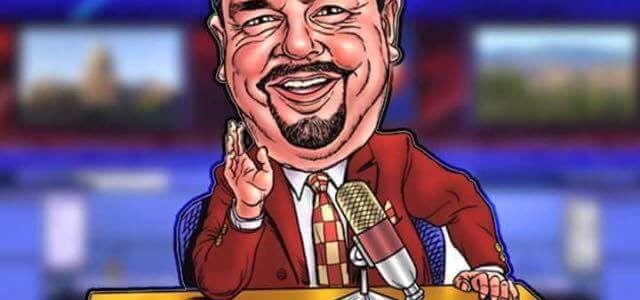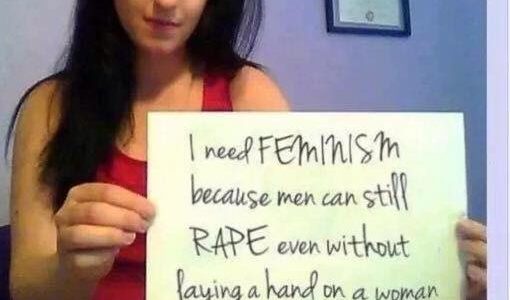Welcome back to the Atlas Shrugged retrospective! Today we’ll be looking at the third and (mercifully) final entry in the franchise, Atlas Shrugged Part III – Who Is John Galt? After the dumpster fires that were the first two films in this series, Aglialoro and company were back with another entirely new cast and a smaller budget than ever! Could they see this series out on a high note? Read on to find out…
Oh, and as with the last 2 entries, be sure to check out my friend Matt’s review at his blog, The M, as we both chose to suffer through this series together!
PRODUCTION
After Aglialoro and his production team poured even more money and effort into marketing Part II, only to be met with resounding financial and critical failure, it looked questionable whether the final chapter of Atlas Shrugged would ever get off the ground. However, the filmmakers were true believers and were not going to be dissuaded. Aglialoro, along with fellow franchise producer Harmon Kaslow, set about seeing this project through and by late March 2013 it was announced that filming would begin in the fall. They were looking for a director, cast and crew at the time and Aglialoro said that “I don’t care if I’ve got to fire five directors — that’s fine. We’re going to get it right.” So, after a declaration like that, who did they ultimately hire? The answer is James Manera, who literally had one directing credit to his name on IMDb at the time, a single episode of Nash Bridges almost 20 years earlier (although he also had directed a couple small documentaries which don’t appear there). Truly Aglialoro and company had to sort through the cream of the crop to see this film series through! Duncan Scott (who had co-written the screenplay for Part II) and Brian O’Toole (who had also written the screenplays for both previous films) were tapped to return to write the screenplay for Part III. While it was announced that both would be returning to write Part III, neither are credited in the final film. Instead, writing credits go to producers John Aglialoro and Harmon Kaslow, along with director James Manera. I wasn’t able to find an answer regarding if Scott and O’Toole’s original screenplay was heavily rewritten by the producers, or if the producers just wrote their own from scratch for (presumably) budgetary reasons, but the fact that they’re the only ones who are credited in the finished product is rather interesting. Also, a fun tidbit – back before Part I was released, Aglialoro had toyed with the idea of having Part III suddenly be a musical, but this idea never got anywhere near the final product. It’s just funny to see that Aglialoro had ideas that could have made this franchise’s continuity even more baffling.
As for the obligatory recasting, the role of Dagny was filled by Laura Regan, probably best known for a short stint on Mad Men, some minor horror movie roles and a number of guest TV appearances. The esteemed role of John Galt went to Kristoffer Polaha, who was similarly best known for a short stint on Mad Men and a number of guest TV appearances (my first thoughts on seeing him in this film were that he looked like a Hallmark channel love interest and, lo and behold, he’s been in 6 Hallmark channel movies since this film came out). Hank Rearden was played in this film by Rob Morrow, who had earned Golden Globe and Emmy nominations for his roles in Northern Exposure and then had a successful run leading Numb3rs, making him probably the biggest name in the cast. The next biggest name in the cast was veteran character actor Joaquim de Almeida, known for big roles in Clear and Present Danger, Desperado and Fast Five among many, many others. De Almeida was cast to play Francisco D’Anconia. James Taggart was played by Greg Germann, who was probably best known for Ally McBeal, but seems to have been confined to minor roles ever since. Rounding out the notable recast characters was Peter Mackenzie as Head of State Thompson, who was a pretty decent character actor in his own right, but was never going to live up to Ray Wise’s portrayal from the last film. Finally, Part III also introduces us to Ragnar Danneskjöld, played by Eric Allan Kramer, who had some big roles in Robin Hood: Men in Tights and True Romance early in his career but had been confined to character roles and guest appearances ever since. Oh and it’s also worth noting that, like Part II, Part III also features conservative celebrity cameos from the likes of Presidential candidate Ron Paul, along with Glenn Beck and Sean Hannity, all providing the “voice of reason” in the film.
While filming was intended to start in the fall of 2013, it did not actually begin until mid-January 2014. This was likely because the producers’ fundraising came up shorter than they had expected (around $10 million split evenly between the filming and marketing budgets) and so they launched a month-long Kickstarter campaign on September 23, 2013! This Kickstarter makes for a very interesting relic to pour over for a retrospective. $446,907 was raised during the campaign by 3,554 backers… but if you look closer at how the numbers break down, at least $100,000 of this was raised by the 10 highest-donating backers! Another 12 contributed a further $65,000+ and then 65 more contributed another $65,000+, meaning that more than half of the funds were supplied by 87 people – a measly 2% of the total backers! Clearly there were lots of rich people who had nothing better to do with their money than to throw it at this film… and, funnily enough, we actually know who some of these people are because 16 people who donated a staggering $7,500 or more had their names very crudely carved into a piece of wood and appear prominently on screen (it’s jarring and funny to see in the finished film though because these rough carvings are flanking carvings which were clearly done with some professional tools beforehand, so their names just look like they were done by angsty teens).
Of course, this Kickstarter ended up generating a number of justifiably snarky comments about how the filmmakers sure were relying on altruism from their libertarian audience to bring about this film after it failed so spectacularly on the free market. Anticipating this response, the Kickstarter featured not one, but two FAQs about how it was not against Ayn Rand’s philosophy to ask people for money, even going so far as to dedicate a whole other article on this topic on The Atlas Society as well. Having learned more about Objectivism from this retrospectives series, I actually do understand their argument, which is summed up pretty well by the FAQ response:
“Kickstarter is not charity and we do not seek charity. We are offering a voluntary value-for-value exchange. If you see no value in any of the reward levels, you should not back the project. Regarding the idea of charity however, Ayn Rand had no problem with someone giving money to a cause they care about. If someone deems a cause worthy and wants to donate money, they should be free to do it. What Ayn Rand had a problem with is altruism for the sake of altruism as a moral duty, or being compelled, or forced, to ‘give.'”
While I do understand their argument, it comes across as a fairly arbitrary distinction to me – whenever they ask for a handout, they’re exonerated because they will say that it’s a value exchange (although charging $7,500 to get your name crudely carved onto a piece of wood sounds closer to a “scam” to me, especially when the film had already been financed and was going to happen regardless). However, whenever anyone else asks for a handout, they’ll characterize them as moochers and looters. Add in the fact that they ignore that even when they’re “forced” to give, there’s still value being created in having a society that functions properly, which would be even more valuable if they weren’t such crusty bastards who hate the idea of other people living at a reasonable standard. So, yeah, I can see how they can justify this Kickstarter within their own philosophy, but it just feels like another convenience to allow Objectivists to do what they want while looking down on people with less means for doing the same.
Interestingly, Rand devotees and fans of the movie franchise were invited to an event at the Atlas Summit in order to help determine the final edit of the film. I wasn’t able to determine how exactly this event went, how involved it was or how it might have affected the final film, but it’s a really interesting detail which shows how the filmmakers were attempting to get directly involved with the public on this particular film. The film was released on September 12, 2014 to a much smaller opening of 242 screens, grossing a measly $851,690 against its $10 million filming and marketing budget. This means that, if you add together the marketing and production budgets of all three films (including the ~$15 million which was spent on Part I before it went into full production), the Atlas Shrugged franchise lost almost $45 million dollars!!! HOLY SHIT!!! Even if you just factor in the costs which went directly into these three films, that’s still a huge, $30 million dollar loss that could have been prevented if the filmmakers weren’t so proud or dogmatic that they insisted on pushing on, ballooning their losses with each misstep.
When she returns, Dagny finds that James has mismanaged Taggart Transcontinental even worse than before, having negotiated deals which would nationalize the railroad and cut off food supplies to the east coast. The government has also gotten increasingly militaristic, building lethal sonic weapons to enforce martial law. Dagny manages to prevent a disaster on the railroad due to her ingenuity and, when she realizes that John Galt has been watching her do this, the pair’s passion finally boils over into a railroad closet bang-session. Shortly thereafter, the head of state arranges a televised speech, but it is interrupted when Galt intercepts the signal and relays his own speech instead, laying out his philosophy and urging the people to join him in his strike. This act of defiance finally causes the government to go looking for Galt to recruit or eliminate him, and he is found when Dagny inadvertently leads agents to his location. Dagny pretends to have done this intentionally and Galt is brought before Head of State Thompson. Thompson offers Galt the highest position he can, with the ability to set his economic ideals how he sees fit, but Galt refuses, saying that no man should have that kind of power. In response, the government decides to torture him for his defiance. Dagny, along with a few supporters from Galt’s refuge, break in and rescue him and the group fly away as the power grid across America shuts down, signalling the collapse of Thompson’s ineffective rule.
REVIEW
Watching Part III is an experience, to the point where I wasn’t more than 2 seconds in when I had to pause the movie to make my first note. The first frame of the film opens with a title sequence that says “The day after tomorrow…”, which just caused a cascade of thoughts. First of all, it shows that the filmmakers really do believe that everything that happens in this film could happen – the cartoonish characters and insane politics on display in these films aren’t just done for illustrative purposes, they really do think that this is what non-libertarians think, believe and behave like. Secondly, this title inadvertently causes confusion, because it immediately got me thinking about the equally-preposterous Roland Emmerich disaster film The Day After Tomorrow. Both films share similar flaws. Both are just fundamentally dumb – in The Day After Tomorrow‘s case, it’s like a particularly dumb environmentalist’s take on climate change, whereas Atlas Shrugged is like a particularly dumb conservative’s take on economics and politics. Again, we’re not even 10 seconds into this film and the first freaking thing we see is causing me to dunk on this film.
Honestly, actual act of watching Part III took me more than twice the film’s runtime to complete because I was pausing to take notes constantly. There were just so many unbelievably dumb things packed into this movie that I could not stop writing. Compared to the inept passion on display in Part II and even Part I, Part III is a clear step backwards because it is so embarrassingly shoddy. I feel like Aglialoro and Kaslow were devoted enough to Rand’s ideology that they felt like they had to complete the trilogy, but after losing tens of millions of dollars on the project already, it feels like this final film was half-assed it to get it over with because it definitely wasn’t going to earn them any more money back. I mean, sure, the other two films sucked, but they at least felt like the filmmakers believed in them and wanted them to transcend their limited budgets. Part III just feels like they gave up and wrapped up the ending of this trilogy as fast and as cheaply as they could. I mean, look at that plot synopsis – it’s so short! I’m not skipping over huge chunks of the plot either, because most of the shit that happens in this film doesn’t matter, it’s just about preaching to the audience and spinning the wheels until the film ends unceremoniously. I have so much to talk about with this film, so strap in, we’re going to tear this thing apart.
First off, let’s start with how cheap this film looks. Cheapness pervades the sets throughout the film. Remember how I said that they loved showing off the bigger sets in Part II, as if they were proud of their improved production quality? Part III ignores scale and set dressing as much as possible, filling a scene with the bare minimum of props and, ideally, seems to just shoot on location as much as possible to save cash. This is immediately apparent from the very first scene. We get a flashback to the Twentieth Century Motor Corporation, in which the heads of the company call a meeting about their new salary structure and John Galt’s strike begins. This scene clearly appears to have been filmed in a worn-out high school gym, rather than a factory, complete with sports line markings on the floor and paint peeling on the walls (this can’t even be for thematic reasons either, because up until this point the company has been run under a Randian ideal so it should look pristine). Even the company’s banner isn’t wide enough to fit between a pair of support columns, so it’s awkwardly pinned at a strange angle, like they didn’t take a proper measurement before they got this thing made up and couldn’t afford a replacement. And this is just the first scene! From there we get bland corporate spaces for Taggart Transcontinental and the government’s offices, and Galt’s valley, which is just a bunch of expensive cottages (note: I’m going to call it “the valley” from here on out – no one ever refers to it as “Galt’s Gulch” or anything like that, they just say it’s “the valley” so that’s the term I’m going to go with).
To top off the cheap sets, the lighting in this film is terrible. It’s usually fine during scenes in the valley – these scenes are brightly lit and colourful, but this feels like it’s only the case because they could get natural sunlight in these scenes to avoid having to pay for a full lighting setup. However, every scene outside of the valley is lit like the inside of my ass. Everything is just so poorly lit and desaturated, made duller by colour grading which turns everything to a cold shade of blue. While this may have arisen from a need to cut down on lighting costs, it has clearly been factored in as a stylistic choice to contrast the “real world” against the vibrancy of the valley. I feel like this might have been somewhat effective if they had been more judicious in its usage and/or reined the effect in somewhat, but when half of the movie ends up looking like a bland, muddied mess, it makes it a stylistic choice which was ill-advised.
Oh and speaking of ill-advised stylistic choices, here are a couple other fantastic moments of cheapness in this film. When Dagny arrives in the valley, she’s taken to a party to meet everyone and the road is lined with paper lanterns… which would be cool, but then you notice that they are literally made of paper sandwich bags with a (probably faux) candle inside! Not exactly the sort of product you’d expect from the “greatest minds in the world”, especially considering that they have an enormous holographic dome covering the entire valley, right? Even worse, they cut to close-ups on these sandwich bag lanterns… twice!!! Oh, and take a look at the screenshot above – they couldn’t even line up these lantern bags straight! It’s such a meaningless moment, but they screw pointless shit like this up at such an alarming rate that you can surely see why I was pausing the film so much to laugh and take notes. Another such moment comes late in the film when the much-hyped, nefarious, secret government torture device, Project F, is finally revealed to the audience and… it’s a car battery parrilla device, like what you’ve seen in pretty much any dark and gritty post-9/11 action movie. This is the sort of radical ingenuity which had to be plundered from the greatest minds in the world? The filmmakers clearly just didn’t give a shit and just went with the cheapest, most boring option they possibly could have, which is especially disappointing considering that Part II leaned more into the sci-fi aspect of the story.
The cheapness of this film goes hand-in-hand with its rushed plot and contrived, heavy-handed storytelling. Let’s say you want to open your film in such a way that the audience will view John Galt as not only a revolutionary figure, but also mysterious. So they start the film at a staff meeting for the Twentieth Century Motor Corporation and show Galt’s initial declaration to “stop the engine of the world”, which makes sense… but then, to hammer home their desire to make him “mysterious”, they have some guy ham-fistedly shout “who is that guy!?”, despite the fact that Galt has been working very successfully at this factory for years now, so everyone here should know him. That’s less than 2 minutes into the film, but it’s a bit of narrative convenience so obvious that I had to stop and laugh at it. Honestly, I probably wouldn’t even mention it if this film wasn’t so ham-fisted throughout – for example, later in the film they need to have the government bad guys convey information to the audience: the government is working on something awful called Project F and they’re planning on having a national televised speech. Rather than doing so organically, they literally just have all of the bad guys have a secret meeting about Project F without going into any details and then someone says “we need to make sure the speech is on all the networks” and then the scene literally ends! No information on what Project F might be, no indication about what “the speech” even is about, just conveying the bare minimum of what they want us to know and that’s it. The film has also been setting up that the railroad has become so mismanaged that Taggart bridge will eventually collapse, a prediction that Dagny has said could never happen. Then, right before the film ends, Francisco just comes out of nowhere and then says “Did you hear? The Taggart bridge collapsed!” It’s just so uneventful and matter-of-fact and Dagny’s non-reaction just makes it a hilarious moment.
However, the strangest bit of narrative convenience definitely revolves around Cheryl Taggart. She had basically no purpose in Part II so I assumed that that meant she must do something important in Part III, but nope. We literally find out that she died when a character casually holds a newspaper up in front of the screen!!! I had to do a double-take, it was such a strange way to write a character out unceremoniously. The film then decides that they have to do a flashback to explain all of this, so with a dream filter over the screen they explain that Cheryl found out that her husband was a fraud, which causes her to apologize to Dagny at some undefined time and then… just died. They don’t say how, but the way that they don’t say how suggests that James had her offed. From what I understand of this character’s fate in the books, we’re supposed to realize that she commits suicide in shame, but that doesn’t come across in this film at all. The filmmakers clearly don’t care about her, they just check off this character’s “arc” as fast as possible and then rush to the next plot point.
Another bit of narrative convenience is that the film cuts to voice-over exposition throughout to let the audience know what is going on. These exposition dumps interrupt the film constantly and are so disconnected from the actual events going on on-screen. Even worse, they gloss over events which probably deserved to be given more importance, such as when it is announced that Hank Rearden has “disappeared” and then his factory workers who were left behind were killed by the government strike-breakers, holy shit!!! Were Hank’s workers a bunch of moochers? Why would he leave them behind to literally die!? And why was this told to the audience impassively? I kept thinking that these exposition dumps were going to tie into the ending, where it would reveal that someone would be recounting what happened in the past during these segments, but no, the whole thing gets dropped by the time the third act rolls around. Personally, I think that this awful ham-fisted writing is probably down to John Agalioro’s screenwriting “talents”. He co-wrote the screenplay for Part I, which had similarly bad writing at times, but it was tempered in by Brian Patrick O’Toole. Part II didn’t really suffer in this regard, presumably since Aglialoro didn’t write it (its writing issues were more a problem of wheel-spinning and bad philosophy). However, Part III gaves Aglialoro and Kaslow full writing credits and it’s clear from the final product that neither of them are qualified to write a screenplay. Like… there’s a part in this film where super-genius John Galt outsmarts the bad guys by getting arrested and then using his cell phone during a meeting with Head of State Thompson to call Dagny and let her in on their evil plans!!! Why the hell would they not confiscate his phone!?! That’s Tommy Wiseau-levels of screenwriting talent!
The bad screenwriting leads to all sorts of unintentional hilarity, such as how it makes Galt’s whole movement look like a dangerous cult. Like, a hidden commune in the mountains living by their own set of rules is already sounding pretty Jonestown, so you’d think that they’d do something to avoid coming across that way. Well, moments after crash landing, Dagny is informed by Galt that there are certain rules to living in the valley. He tells her that, most importantly, no one gets a free pass at someone else’s expense. The whole exchange is shot and staged in such a way that it feels like Galt is heavily implying “you’re gonna have to fuck me if you stay here”. Then there are the oaths that everyone in the valley are forced to make in order to stay, the way that this community has been isolated from differing opinions, and how all of Dagny’s old friends plead with her to throw away her life, ideals and very identity to join this lovely little movement. This is best shown in two different scenes. The first is when Dagny’s friends identify that she just wants some acknowledgement for the things she has accomplished and so they give her adulation for a job well done to try to goad her into staying. The second comes when we see that all of Dagny’s friends have carved personalized messages over her bed for her to read when she goes to sleep!!! Read this way, it ultimately turns Part III into a depressing story about how a cult tears away Dagny’s support system until she loses her will to help people and then joins the cult herself. It reminds me of The Endless, and if this film had even an ounce of self-awareness we could have gotten an awesome film about Dagny fighting back against this cult which has been leeching away the stability of the world’s economy.
Of course, Aglialoro and Kaslow can’t even hit the important parts of Atlas Shrugged well. Perhaps most tellingly, the romance between Dagny and Galt feels totally forced and unnatural. Sure, the film tries to tell us that they’re totally into each other from the first time that they lock eyes, but it never feels convincing. Considering that Ayn Rand herself said that Atlas Shrugged was ultimately nothing more than a love story, this is pretty damning criticism. Dagny’s insistence on aiding the world is totally at odds with Galt’s insistence on allowing things to get worse. Maybe if he grew and changed his opinion this could have worked, which seems to be implied when Dagny and Galt have an impromptu fuck-session after Dagny organizes a plan to prevent a rail disaster from occurring (which, by the way, is definitely the funniest scene in the film – they don’t even know if the plan worked or if there are people dying out there, they just need to get their rocks off pronto). However, it turns out that Galt’s values haven’t changed at all, and in fact it’s Dagny’s which are cast away by the end. Other than that, we’re given a bunch of boilerplate Hallmark movie moments where Dagny and Galt sight-see around the valley, which apparently is a shorthand for blossoming romance without having to do any real groundwork to convince us that they actually like each other.
Then there’s Galt’s big speech, which is ~60 pages long in the original text (or over 3 hours if spoken aloud!!!). Like d’Anconia’s “money speech” in Part II, this speech has been pared down considerably, running in at just under 5 minutes. Personally, I feel like it comes across better than d’Anconia’s speech did, but that’s for a couple of unintentional reasons. First of all, it’s significantly less nasty and confrontational than d’Anconia’s speech was. Secondly, the text has been cut down so much that you could interpret it as a call to stand up against exploitative businessmen, rather than just the government, which is probably way more communist than they were intending. It also doesn’t help that this exact same message has been hammered into the audience’s head all through the first half of the film, so by the time it comes it’s just 5 minutes of more-of-the-same rather than a revolutionary statement. The plot also just halts entirely during this 5 minute sequence, so the fact that it’s conveying information we already have been told repeatedly does it no favours. Maybe if they had cut out all the lectures when Dagny was in the valley this could have landed stronger, but coming long after them just feels like more wheel-spinning in a film filled with it.
The dialogue is also just baffling at times, to the point where I don’t know if they’re just lifting lines awkwardly from the text or if they’re using the first take from each shot, mis-remembered lines and all. Like, just look at that line above – I had to rewind the film several times to make sure I wasn’t mishearing or misunderstanding that line, because it sounds like it went through Google translate. What the hell is “It’s like I can’t believe you’re alive” even supposed to mean? I guess that Francisco was under the impression that Dagny was dead based on the news of her disappearance, but wouldn’t he say “I thought you were dead!” instead? “I can’t believe you’re alive” would even be better, if still a really awkward line. “It’s like I can’t believe you’re alive” just makes no sense whatsoever. It’s not the only line like that though. Later, John Galt takes Dagny to the power source for the valley and there is an oath emblazoned above it. He then says “Everyone has taken that oath who lives in this valley.” …what? Again, I don’t know if this is some important line from the book or Aglialoro and Kaslow’s writing, but it just sounds wrong. I had to look up active vs passive voice just to make sure I wasn’t forgetting some grammatical rule, but even that makes this seem totally wrong – the people in the valley should be the subject and the oath is the verb, so shouldn’t this be “Everyone who lives in this valley has taken that oath”? That’s way less awkward and gets the point across more succinctly, in my opinion… but what do I know, I’m not some rich super-genius now am I?
Of course, it’s not just the actual writing which is awful in this film, the editing is also terrible. This wouldn’t be an Atlas Shrugged film without an insane amount of narrative padding, and boy is there ever a lot of wasted time in this film. The first time we see this is when John Galt takes Dagny to his home after her plane crash. This sequence involves a long shot of Galt’s car driving down a road, the car driving to his house, Galt getting out of the car, walking around it to open the door and then pick up Dagny to take her into the house… hell, they even had to show him closing the car door, just so we wouldn’t be left wondering if he did. All told, this whole sequence takes 45 seconds to do something that could have been done in 10-15 by a professional editor. Sure, that’s just one 45 second sequence, but it’s emblematic of the film itself, as it is just loaded with sequences that don’t actually add anything to drive the plot or characters forward. This kind of editing is a trend throughout the film, as there are numerous pointless establishing shots of nature and people travelling to places, almost like something from the Left Behind books. It got to the point where I was laughing at every new nature montage, but by the time I was learning to expect them, they escalate into a sequence which is truly special. When Dagny chooses to leave the valley, John Galt takes her to his plane and starts it up, resulting in a flying nature montage as they leave… then, moments after they land and say their goodbyes, we get another shot of the plane starting up and then leaving, and then we get a train nature montage as Dagny returns to civilization (gotta waste another 2 minutes of this film somehow)! Now, to be fair, these nature shots are probably the best shots in the film due to the inherent beauty of mountains and wilderness, but they’re also completely pointless to the plot, so what does that tell you about the film itself… oh, and there’s also a good chance that most of them are stock footage, so double yikes! It’s like they don’t think we’ll understand how characters get from place-to-place without showing several seconds of unnecessary travel and unimportant nature footage. (EDIT: Actually, I think that the filmmakers might just think that we’re all stupid. I was going back through the film to freshen up on some of the details and noticed a scene transition which is literally a extended shot centered on a wine bottle’s label – this would be notable even if it was just bad product placement, but this was for a fictional vineyard for one of the characters. Then I realized that this shot was from some other footage from this scene, zoomed in significantly to show off the blurry bottle so we know where this scene is supposed to be taking place, and then put into slow motion as well for no discernible reason!!! They didn’t think that this wine bottle, which is present during the entire scene, wouldn’t be enough of a context clue within the scene? Holy shit this film is just a treasure trove that never stops giving back to me!)
While the constant time wasting is probably the most obvious example of bad editing in this film, there are other instances peppered throughout. The next most obvious example would have to be when a railworker calls Eddie to warn him that the rails are so mismanaged that there is going to be an imminent disaster. It’s a classic set-up for a potentially tense scene, reminding me of the train crash from Part II. Will Dagny be able to stop the disaster in time? Hah, just kidding, nothing happens after this phone call. I was really confused at first – weren’t they playing this thing up like people were literally about to die? What happened to the urgency? But then it turns out that the disaster was actually going to happen a few days later (several minutes later in the film), but it makes the urgency of this initial warning so strange. Why did they not just have this worker warn them of the disaster right before it was going to happen instead of doing nothing about it, moving the story forward, and then coming back to it later? It would have made for a much more tense sequence, but instead it just deflates the tension. There’s another editing choice near the end of the film which just left me baffled. I’m not even sure where else to put this because it’s so strange – the bad guys get mad because Project F breaks and then when they’re leaving the room there’s this completely random and pointless slow motion sequence where one of the bad guys yells “We’ll be back, you son of a bitch!” I cannot understand this editing choice at all… Like, it’s random enough that I really hope it was something that was suggested at that Atlas Society meeting I mentioned earlier though, where “the fans” got to provide input on the final cut of the film. I hope that there was just some dude there who yelled “Needs more slow motion!” and they decided that this was the only moment tense enough to work. I need an explanation because this is possibly the most baffling moment in the whole movie!
Then we come to the fact that the filmmakers once again recast all of the characters in this film. Even moreso than Part II, Part III demonstrates why it’s not a good idea to recast after every film. There are so many moments in the early parts of the film which rely on Dagny reuniting with familiar faces that had disappeared, but every time they would introduce them I would go “am I supposed to know you?” Hell, I was even getting characters mixed up because of this; early in the film I kept thinking that Akston was Quentin Daniels from Part II, because characters constantly flit in and out of this series and I didn’t have any visual reference for the character any more (it’s bad enough that I didn’t even remember who Akston was supposed to be until I went back to edit my review of Part I). It’s also a particular issue with the bad guys, because the film then has to pause and waste another 15 seconds telling us who everyone is with freeze frames and pop-up text. It also doesn’t help that characters who were important in the previous two films are shunted aside in this film. Hank Rearden is the most obvious and perplexing example of this. In the previous two films, he was the co-lead and second point-of-view character along with Dagny. He had also had some pretty big character moments in Part II, between his victory in court and being coerced into signing away his patents to Rearden Metal. Clearly they were setting him up to have some sort of big role in the third film, right? Nope, he gets about 10 seconds of screen time, leaves a voicemail and then is unceremoniously dumped from the story! What the hell!?! I can’t help but feel that he had a bigger role in the original story but they didn’t have time or budget for him and so wrote him out. All that said, he’s so absent in this film that I’ve read that he’s involved in the rescue mission to save John Galt at the end of the movie and had no idea – he’s not highlighted, nor have we seen enough of him in this film to even realize that it was him anyway. While not quite as important, Wesley Mouch is another prime example of this shunting issue. In the previous two films, he was arguably the primary antagonist, but in this one he barely shows up and his purpose is replaced almost entirely by Head of State Thompson. It doesn’t help that the actor who was cast to play him is very indistinct and looks very similar to Head of State Thompson, to the point where I cannot remember even seeing him beyond his introductory scene (and even then, only because they literally put text on the screen to say that he was Mouch).
As for the comparisons of the cast, Part III has by far the worst cast of the series. The only actor who might have put in the best performance of his character would be Greg Germann as James Taggart, but that’s just because the character is such a cartoon that I can’t really say that there was a “definitive” take on him. Greg Germann tries to take him in a somewhat more serious route, but there’s only so much you can do with James Taggart. The rest of the cast are just the bottom of the barrel. I don’t know if Laura Regan is a good actress or not, but she is just terrible as Dagny. Her line deliveries are flat and unconvincing throughout and her facial expressions don’t match the tone she’s trying to convey. It’s such a shame, especially after Samantha Mathis made me actually care somewhat about this character in Part II. Oh and speaking of which, Laura Regan is 8 years younger than Mathis, but looks even younger, providing a bit more whiplash about the recasting (especially when her former lover, Francisco, shows up looking like he’s 69 years old now). John Galt wasn’t really much of a presence in the previous films, but he always had some sort of mystery to him. Fully unmasked, Kristoffer Polaha’s Galt is just a Hallmark channel boy hunk, not the genius architect of the revolution that’s crippling society. I never found him particularly convincing, although compared to Laura Regan he was certainly the better of the two leads. In some ways, it’s probably best that Hank Rearden got written out, because the one line Rob Morrow delivers for him is so bad. I miss Grant Bowler’s more charming take on the character. And, as I alluded earlier, Joaquim de Almeida looks waaaay too old to be Francisco d’Anconia – he’s 20 years older than Laura Regan, and considering that she looks younger than she actually is, it suddenly begs the question of when exactly Dagny and Francisco were supposed to be a couple. De Almeida is a good enough actor that he’s fine in general in the role, but he’s clearly not stretching his acting muscles any. As douchey and sinister as he was, Esai Morales’ take on d’Anconia was probably the best, because at least he brought some energy to the role. Lastly, considering that Head of State Thompson only had a cameo appearance in Part II, you’d think that Peter Mackenzie would have an easier time becoming the definitive performance for the role… however, considering that that cameo appearance was portrayed by freaking Ray Wise, Mackenzie was screwed from the start. He’s fine as a scenery-chewing villain, but when you’re competing in that role against Ray Wise, you’re never going to win. The cast is bad across the board, with only a couple performances reaching the level of “fine”.
For a story that’s supposed to be extolling the virtue of selfishness, Part III does the worst job of trying to justify this. During what might be the most offensive moment in the entire trilogy, Hugh Akston tries to change Dagny’s view of conventional morality. He claims that believing that you have to help people is wrong because it causes unworthy people to get into positions of power. He claims that, in conventional morality, you are considered virtuous for what you do for others rather than what you achieve. This is a patently false assertion. Just look at people like Oprah, Steve Jobs, Michael Phelps, Daniel Day Lewis, or Stephen Hawking – people who are known and praised for their personal successes. Bill Gates might be the most obvious denial of this whole idea, since he’s a self-made uber-billionare in the Randian mould, except that he’s famous for his personal successes and praised for his altruism. Still, that’s not even the worst part of this scene. Akston claims that, because of this view on conventional morality, the unworthy will forcibly take from “those who have earned their money” in order to help the less fortunate if they will not comply. He then delivers this line:
“You’ve heard them say that people have a right to a living just because they’re human. And that’s not the right to earn a living, that’s the right to a living, which you are required to give to them.”
Woooooow. The filmmakers tried to explain Randian philosophy in the most reasonable-sounding way possible, but it still comes across as fucking evil. Akston straight-up admits that he doesn’t believe that people have a right to a living just because they exist. As far as he’s concerned, if you’re not doing something to “provide value” then you might as well die because you’re doing nothing to deserve your life. The serious ethical concerns of this should be obvious and numerous:
- What about those who are injured while working? Sure, they were providing value for a time, but might as well let them and all of their dependants starve to death now! Or what about if, due to the negligence or unethical practices of a company, people are injured? Should there not be a legal right to a living for these people, considering that they were robbed of it by the actions of someone trying to enrich themselves?
- What about the elderly who can’t work anymore, especially if they never had enough means to have any savings for retirement? Better just to set them loose in the woods during the winter.
- What about freaking kids? When does this philosophy even come into effect anyway? Kids are not only going to be providing no “value” for several years, but they are going to be actively draining their parents’ resources as well, meaning that only those who are very well established will be able to actually afford to have children within this economic framework!
- What about those who actually are working but still aren’t able to get by? Live in a hovel, you moochers!
Rand was very intentionally going against conventional morality here, because she viewed it as a framework which enabled the “oppression” of the great minds in society. Central to this was that religious principles were nothing more than another tool of the people in power. In order to show this, the filmmakers considered including a scene where Dagny meets a priest. I can already imagine this scene playing out in my head, but the fact that it was cut from the final film is pretty telling. Many of the libertarians who parrot Rand’s talking points are Christian, including the right-wing celebrities who cameo in this film such as Sean Hannity and Ron Paul (and Glenn Beck, who is Mormon). There’s already some significant cognitive dissonance required to call yourself a follower of Christ while also claiming that people who can’t provide value don’t deserve to live, but imagine if the filmmakers had included a scene where they explicitly stated that religion goes against their worldview. Half of this film’s meagre audience would be outraged at their audacity. This whole attempt to redefine morality just pisses me off though, and is by far the worst segment in the entire trilogy. When Akston dismissively states that “their philosophy is based how much you sacrifice to other people, not on what you achieve”, I could not help but think of Jesus’ words about how the rich donate large amounts to show off how generous they are, but the poor widow who donates gave everything she had and was therefore viewed as more generous. Contrast that to Galt and his followers, who are throwing a hissy fit because the government is forcing them to skim some of their wealth in order to help other people? Fuck you all.
Galt’s explanation to this criticism is that “We honour charity and benevolence, but it must be provided on the giver’s terms, voluntarily and not by force.” While I can see some value in the argument that they’re making here, it ignores a couple of things. First of all, Galt and his followers will staunchly refuse to give to any cause, no matter how worthwhile, if there is any force involved or implied. They could merely volunteer to give to a cause that they think is worthy, but we never see anyone actually do this (in Part I, Hank makes a donation to a cause he doesn’t agree with, but this is done out of a feeling of obligation).
Secondly, the actions of the characters contradict any notion that they might care about charity or benevolence. Seconds after Galt makes that statement, Dagny asks “What about what you left behind?”, referring to the rest of the world and all of the people who are suffering under the economic collapse Galt engineered. Galt simply says “We left nothing behind, Dagny. We took with us the only real thing of value. Dagny, this is a strike of our minds.” So clearly they don’t see anything of value in the outside world – everyone there is a moocher and it doesn’t matter to Galt if they suffer or die without them. This is barely even subtext either – it’s not like the people in the valley don’t realize what is happening in the outside world, they just don’t care. Part of the oath that everyone in the valley must take is that they will not “live for someone else”. Galt himself tells Dagny that, because there is no one competent to run the railroads, Taggart bridge will collapse imminently, showing that he doesn’t really care that innocent people are literally dying because of his strike.
Thirdly, there are several moments in the film where characters reveal that they have technology that could revolutionize the world, but have chosen not to for no discernible reason. For example, Dr. Hendricks inspects Dagny’s injuries using a handheld diagnostic device, similar to a handheld x-ray, and says “every doctor should have one”. Well, gee doc, if that’s what you think, what’s stopping you from giving one to every doctor? It’s not like he’s even going and selling them either! He has life-changing technology at his disposal and he’s choosing not to give it to anyone else. Or there’s the fact that Galt has a car in this film. It took me a little bit to realize “wait, no one drives cars in this universe, what the hell?” Considering that gasoline is extremely expensive in Atlas Shrugged and can’t really be being refined in the valley, it’s likely that they have come up with some sort of alternative fuel source… which, one again, they’re just hording here and not providing to all of the people being forced to deal with the increasingly-deadly rail lines. Perhaps the biggest “fuck you” in the whole film though comes when Galt reveals his working motor which has been hyped up in the previous two films. He reveals that it costs virtually nothing to maintain it and it’s so powerful that just one motor held in a space the size of a shed could power the entire West Coast!!! Again, this is so cheap that he could literally give it away – can you imagine unlimited, free, clean power for everyone and the sorts of changes that that would make in society? Hell, he could even sell it at an unrealistic mark-up and still change the world for the better. But, again, John Galt chooses to horde this because all he wants is appreciation and the ability to refuse people who don’t kowtow to his way of thinking. Tell me again about how you value benevolence Galt, because you sure as shit don’t demonstrate it in your actions.
Galt makes the claim that he is not imposing his values on the rest of the world, merely leaving the moochers to go about their own business, but this is also demonstrably false. Crippling the world’s economy in protest and hijacking the airwaves in order to convey your manifesto are hardly unimposing gestures, but what really contradicts this is that Galt is in league with Ragnar Danneskjöld, a literal pirate. Ragnar has been raiding shipping lines, stealing raw goods which (in his view) have been forcibly taken by governments so he’s just stealing them back. It’s one thing to, say, have Ellis Wyatt burn his oil fields and then disappear for good, but it would be another thing entirely if he kept coming back to burn down any reconstruction attempts, which is basically what Ragnar is doing here. Hell, at one point in the film, Dagny laments that there isn’t enough copper wire left to keep the trains running, which prompted me to say “hey, maybe tell your friend Ragnar to lay off then, he’s the one causing this shortage”, especially since it’s literally leading to the starvation of chunks of the population. At what point do these brainwashed Galt cultists think that goods have been acquired fairly? They are clearly trying to hasten the economic collapse, no matter how innocuous and innocent the film wants to portray them to be.
And how about these “greatest minds” that Galt has been taking to his valley? One of the first we’re introduced to is Midas Mulligan, owner of America’s largest bank. This struck me as a particularly odd choice, since isn’t banking largely the manipulation of money which d’Anconia was raging about in the previous film? Apparently it doesn’t count when private citizens do it, because Mulligan gets a whole monologue about how he’s been “wronged”. According to Mulligan, he made his fortune by lending money to people to buy homes and build businesses, saying that “I only loaned to those people I was confident could repay me” (eg, the people who were already rich and well off). However, then the government forced him to make slightly less of a profit by lending to people who couldn’t repay him, so he immediately threw a hissy fit and left for the valley. So… he couldn’t collect years of additional interest payments on the people who couldn’t pay him back? I wonder how many fans of this film also would cite It’s a Wonderful Life as their favourite Christmas movie, because Mulligan sounds exactly like that film’s villain, Mr. Potter. In that film, George Bailey bends over backwards to try to help the poor and disenfranchised in order to give them a chance at a life they otherwise may not have, and most people would indeed say he is virtuous for doing so. Can you imagine someone trying to claim that Mr. Potter was the one who was actually virtuous and that we need to be more like him? That’s basically the message Part III tries to hammer into you during its entire runtime.
One of the other notable “great minds” we get introduced to is Dr. Hendricks, who claims that he got sick of the government telling him how to treat his patients, so he ran off to the valley to treat them using “his own professional judgement”. This immediately got me thinking of Dr. Suchong from Bioshock, along with basically every other mad doctor trope. The film even unintentionally endorses this theory since Hendricks claims that his handheld diagnostic device was only made possible because there was “no red tape” to stop him… which begs the question of just how many people were killed, irradiated and/or sterilized to make this thing possible. Most doctors will tell you that regulations exist for a damn good reason and there’s also a reason why travelling to places with loose regulations is both a punchline and incredibly dangerous. But, just like in Part I, Hendricks is “worthy” so there shouldn’t be any restrictions on him, because he’s always right about everything (besides, if he did kill someone then that would mean that he wasn’t worthy after all).
This film also brushes up against so many issues which could have challenged the cartoonish take on reality that they’ve constructed, but which are just ignored. One such example is that Dagny meets a mother in the valley who is homeschooling her children. This scene feels like it was just thrown in to pander to conservatives who have a boner for homeschooling their kids, but in practice it raises so many more questions: if she’s homeschooling them, then how is she managing to pay her own way in the valley? Or how are the kids creating any value for that matter? Is wanting to homeschool your kids all that it takes to have John Galt invite you to his valley? Who knows! The film just introduces the concept in order to let all those conservative mommies know that they’re doing a Good Thing™ and then moves on without addressing any complications.
Or what about the fact that Dagny is expected to pay for her own medical treatment after the plane crash, revealing that there is (obviously) no healthcare in the valley? How many people have become ill and died in the valley because of this? Why don’t we see any of the people who have become destitute because they can’t pay their medical bills anymore? Oh, right, those don’t exist because Part III exists in a fantasy reality.
Or what about the fact that the valley seems to have a number of menial workers providing everyone with food and labour? We see restaurant workers, a farmer’s market, and a coal mine (amongst other things) while in the valley, but who is actually manning these? Did John Galt convince the greatest minds in the country to come to the valley and then make them start doing coal mining to stay alive? Or was he so comprehensive that he found the best coal miners in the world and then promised them a better life where they can mine even more coal? And if that’s the case, why didn’t they bring Hank Rearden’s factory workers with him when he left (because presumably Hank would have only retained workers who were up to his standards) instead of leaving them to be killed by strikebreakers? That’s the thing that’s being overlooked here – in order to work, the valley can’t just be a collection of the greatest minds in the world, there still has to be a much larger class of menial workers whose labour is being exploited to prop up those “great minds”. Such a reality is completely overlooked by this film though and instead Dagny spends all of her time interacting with the “important people”, much like she would have been doing back in the real world anyway. It makes you wonder why these “greatest minds” never get into positions of power in the “real world” of Rand’s fiction, and instead it’s always the unworthy. That seems to be something that people overlook.
It’s also worth noting the demographics of the people in the valley. I went in figuring that it was probably going to be mostly white men, but I was surprised to see that, in the crowded scenes in the valley, there was almost a 50-50 split between men and women. It only occurred to me during the writing of this retrospective that that might be because these women are mostly the wives of the great minds, but I’ll stick with my charitable first impression and assume that they at least gave women some consideration for their achievements. However, I can’t say that I saw anyone who wasn’t white and am not surprised about that little revelation at all. Can you imagine the filmmakers even thinking to diversify their extras to avoid troubling implications? Funnily enough though, at the very end of the film, the franchise’s only notable minority character, Eddie, is apparently rescued by Galt’s followers. His makes him not only the token black guy of the franchise, but the token black guy of Galt’s movement too, how fortunate! Even funnier is the fact that I found out that Eddie was changed into a black character for Part I and that this change was maintained in each subsequent film. Considering that characters change drastically in the franchise (including other race-swapped characters reverting to their whiteness from the book) and that Eddie’s rescue at the end changes him into someone who is deemed “worthy” to come to the valley, this suggests that Eddie was literally changed in order to make him their token black guy to avoid claims of racism. After all, they couldn’t possibly be racist for implying that only whites are the greatest minds in world and the only people worthy of success, and that therefore all other races have no right to a living unless they earn it! But who knows, maybe I just missed out on deleted scenes where there were a ton of black people in the valley who were off in Akston’s farm picking cotton or something…
Having learned more about Objectivism from watching these movies and researching Rand’s philosophy for these reviews, I must say that it’s a strange ideology to cling to. This story always lifts up the inherently superior “great minds” that apparently push our society forward, but they have little basis in reality. These great minds are always portrayed as being the heads of companies, but that’s rarely the case now is it? Modern companies are governed by complex structures which might steer the direction of the company, but they rarely are the source of innovation, not to mention that it’s questionable whether they deserve to make dozens, if not hundreds, of times more annual salary than the people who actually work on the frontlines of their business. We’ve seen just how alien the world of these three films is and how cartoonishly black and white it has to make the world if it wants Objectivism to make any sort of sense. If anything, in a modern context Galt’s strike sounds like a call for workers to rise up against the bourgeois, a notion which Rand would have considered repugnant. The only real aspect of Objectivism which seems to have any real basis is the desire to not be forced into doing anything, but that’s hardly a strong enough idea to cling a whole ideology off of. If anything, the deregulation that they have wanted so badly just seems to turn their closest analogues of “great minds” into something closer to the manipulators and moochers that they despise so much.
But seriously, fuck this franchise and the people who made it.
1/10
And now that we’re through the Atlas Shrugged retrospective, it’s time to rank the films from best to worst!
1. Atlas Shrugged – Part II – 3/10 (I had a reeeeally hard time picking between this and Part I, but I ultimately gave Part II the edge because at least Dagny comes across as a good character, even if it wasn’t in the way they actually intended.)
2. Atlas Shrugged – Part I – 3/10 (Again, it’s basically a toss-up – do you like your films boring or offensive?)
3. Atlas Shrugged Part III – Who Is John Galt? – 1/10 (While it is by far the worst film in the series, it is also the only one I would actually recommend, because it’s so bad that it’s an experience.)
